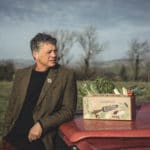Having caught up on rain-delayed plantings of cabbages, lettuce, and broad beans, we are now busy planting tomatoes, peppers, cucumbers, and chillies in our polytunnels, and squash, sweetcorn, and runner beans outside. The first April sowings of peas and broad beans have emerged so quickly that they have already surpassed those forced into a cold, wet seed bed in March. Farmers with the patience to wait for good soil conditions have once again been rewarded.
Our hedges have burst into life with a vigour that I always find uplifting – the only exception being the tortured ash trees, which are struggling with the now-ubiquitous fungal disease, ash dieback. We are expected to see losses of 80 per cent or more, with a massive impact on Devon’s hedges and woods. There are still a few wych and English elms struggling on in their five-decade battle with the Dutch elm disease that swept across the farm in the 70s and 80s; they are now so rare that I had to use an identification app to recognise them. The gaps left in the hedges have largely been filled by sycamores and chestnuts – but the loss of these trees is a landscape tragedy that England will take a century to recover from. It makes me cherish our beloved beeches and oaks all the more.
Most of the crops we planted over the last month are doing well – but some of our perennial crops, like rhubarb and artichokes, are struggling. They have pale leaves, suggesting they lack nitrogen. Over winter, heavy rains beat down the soil and leach this highly soluble nutrient out of the reach of roots. But in spring, the soil warms up, and the bacterial and fungal community around the roots begins to recycle organic matter and release nutrients again. For reasons I don’t entirely understand, cultivating (tilling) the soil between the rows of plants seems to accelerate this spring awakening, as well as helping with weed control. This year’s rainy spring not only exacerbated the nutrient leaching, but also made inter-row cultivation impossible – and we are now paying the price.
Artichokes are recovering, but the rhubarb stalks are so slender that picking them is uneconomical. In difficult years like this, I almost long for the synthetic, highly soluble ammonium nitrate that is available to my non-organic neighbours – but until the weather dried up last month, most of their fertiliser would have just ended up washed into our waterways anyway.
















Last weekend I was lucky enough to catch a showing of Six Inches of Soil – a movie that was made three years ago. It was a TOTAL JOY!!! I kept thinking that Riverford would be included but it seemed it was based on three particular farmers/growers. It was still wonderful but – I wonder if the Riverford people know about it? (I’m sure they must do.) It also made me think that – I can see a massive movement happening – in the same way as we can see seeds planted and then begin to sprout, I would suggest that seeds of awareness and kindness were planted during the pandemic and we’re now beginning to see the results. For me, consciousness, consideration and collaboration were the words to cover a better way for humans. The evolution of the human race is happening constantly and the next move is for People Power – time for ordinary people to make a stand. We need every single person to be conscious of every move – yes, that’s a lot to ask but – we CAN do it!! So – marches to parliament, petitions and more are the seeds that are now beginning to sprout and the sooner we all join together, the sooner we will have the strength and the power to make a difference. In the words of many younger people: System Change Not Climate Change. Meanwhile, here is a link to ‘What Happened Next’ to the people from Six Inches of Soil. https://8point9.com/8-9-newsweek-podcast-six-inches-of-soil-three-years-on/